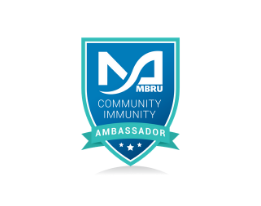MBRU amongst 10% of Institutions to Receive Full Institutional Accreditation from Saudi Commission For Health Specialties
Mohammed Bin Rashid University of Medicine and Health Sciences (MBRU) has been awarded the full Institutional accreditation by the Saudi Commission for Health Specialties (SCFHS), among 12 health institutions representing 10% of the health institutions that obtained the institutional accreditation.
The accreditation is valid for a period of 4 years, it was awarded after the SCFHS institutional committee completed a thorough evaluation of MBRU’s campus, including academic structure, level of educational facilities, and an assessment of the MBRU faculty and its ability to effectively provide SCFHS-approved programs.
The evaluation included assessment of MBRU’s collaborations with Mediclinic City Hospital, Dubai Dental Hospital, Al Jalila Children’s Specialty Hospital, Al Amal Psychiatric Hospital, and Rashid Hospital, Dubai. The report also highlighted the series of strategic partnerships forged with prominent multidisciplinary healthcare institutions globally, which according to the committee reinforces MBRU’s ability to create an educational environment conforming to the highest international standards.
SCFHS is responsible for supervising and evaluating training programs, as well as setting controls and standards for the practice of health professions in the Kingdom. The accreditation means MBRU programs including two programs, the Al Jalila Children’s Child and Adolescent Psychiatry Fellowship Program and the Al Jalila Children’s Pediatric Residency Program are aligned with SCFHS regulations and the commission’s goal to improve professional performance, develop and encourage skills, and enrich scientific theory and practice in the different health-related fields.
Institutional accreditation by the Saudi Commission for Health Specialties aims to provide and harness all administrative, educational, and clinical resources in the training centers for the postgraduate professional healthcare programs (General Board Certificate, Subspecialty Fellowship, or Health Professional Diploma) supervised by SCFHS. As a result, it creates an ideal learning environment based on health education principles for both trainers and trainees, and it allows trainees to be highly trained and qualified for safe professional practice.
Dr. Amer Sharif, Vice Chancellor, MBRU, said: “We’re very humbled to receive this accreditation from the Saudi Commission for Health Specialties. Our aim is to develop healthcare professionals of tomorrow and provide the community with qualified physicians and healthcare professionals who are efficiently able to address the evolving needs of a healthcare sector that is in the midst of rapid transformation, both in the UAE and beyond. This recognition means that we’re moving in the right direction and making progress in our mission to become a global hub for integrated healthcare education and research at the service of humanity.”
“Currently we serve as the academic partner for the Child and Adolescent Psychiatry Fellowship Program and the Pediatric Residency Program at Al Jalila Children’s Specialty Hospital, which are both aligned with SCFHS. This accreditation paves the way for us to develop more residency and specialized fellowship programs in conjunction with hospitals and healthcare institutes in the future, which will further strengthen our work in creating an integrated academic health system. We thank the commission for sharing our vision and for their trust in our institute,” Dr. Amer further continued.
The Executive Director of Accreditation, SCFHS, Dr. Hussain AlHussain commented, “At the Saudi Commission for Health Specialties, we issue the Full Institutional Accreditation Decision valid for four years to the Training Centers that fully meet all Institutional Accreditation Standards; representing the Essential Training Requirements (First Category), which are required to execute Postgraduate Health Professional Training Programs, focusing on various aspects related to training governance, effective supervision of training, ensuring its alignment with principles of patient safety, healthcare quality and the trainees’ well-being; in order to equip the trainees for safe professional practice, and enable them to competently provide compassionate healthcare service to the community. So far, 12 healthcare institutions (10%) received full institutional accreditation out of 122 healthcare institutions that have been surveyed for Institutional Accreditation over the past 18 months.”


